Have you ever wondered why you consistently wake up at the same time every night? While many factors can influence sleep patterns, a fascinating perspective from Traditional Chinese Medicine (TCM) points to the Chinese Meridian Clock as a key factor. This ancient concept links specific time periods during the night to the optimal functioning of various organs. In this comprehensive guide, we explore how the Chinese Meridian Clock explains your nightly awakenings and what you can do to improve your sleep quality naturally.
Modern sleep disorders, stress, and lifestyle habits are common topics in health discussions today. However, many people are not aware that your body’s internal clock—or circadian rhythm—is intricately linked to the energy flow through your organs.
What is the Chinese Meridian Clock? Understanding Traditional Chinese Medicine and Sleep Patterns
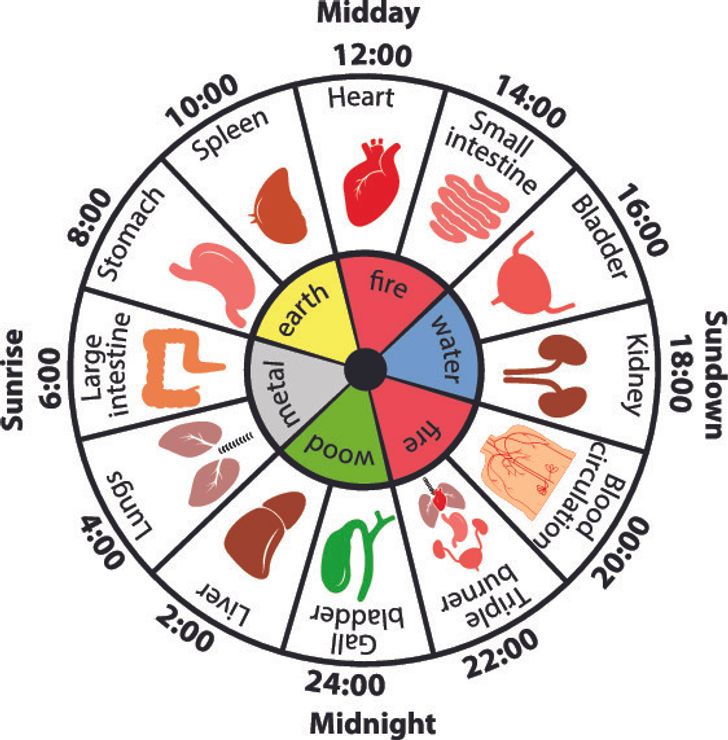
The Chinese Meridian Clock is a concept rooted in Traditional Chinese Medicine that maps out the body’s energy, or Qi, flow over a 24-hour period. According to TCM, each two-hour block of the day corresponds to a specific organ system. These organ systems are responsible not only for physical health but also for emotional and mental well-being.
TCM practitioners believe that disruptions in this energy flow can lead to physical ailments and sleep disturbances. When your sleep is repeatedly interrupted at a particular time, it might be a sign that a specific organ is under stress or not functioning optimally. By understanding the Chinese Meridian Clock, you can gain insights into which organ systems might be contributing to your sleep issues and how to address them.
For a deeper understanding of how TCM views energy flow and sleep, consider exploring resources like Traditional Chinese Medicine Concepts on the National Institutes of Health website.
21:00-23:00 – Thyroid: The Role of Thyroid Health in Sleep and Metabolism
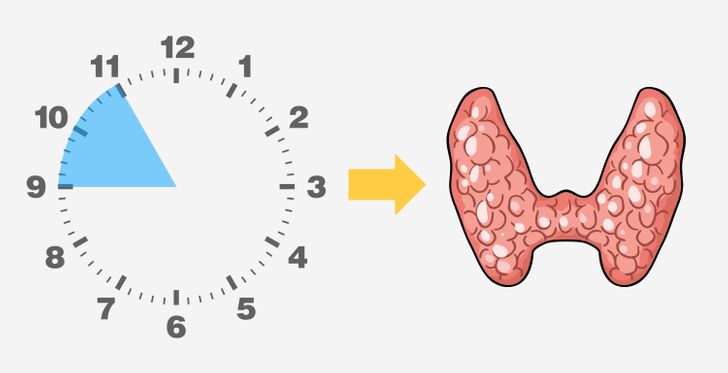
Between 21:00 and 23:00, the Chinese Meridian Clock highlights the thyroid gland—a critical player in regulating metabolism, energy production, and overall hormonal balance. An imbalance in thyroid function can lead to a host of issues, including insomnia and metabolic disturbances.
How Thyroid Health Impacts Your Sleep
- Hormone Regulation: The thyroid produces hormones that control metabolism and energy levels. An overactive or underactive thyroid can disrupt sleep by affecting your body’s energy management.
- Metabolic Rate: Thyroid imbalances can cause fluctuations in body temperature and energy, making it harder to fall asleep or stay asleep during the night.
- Stress and Anxiety: Thyroid dysfunction is often linked to mood disorders, such as anxiety and depression, which can further disturb sleep patterns.
To maintain optimal thyroid function, consider incorporating a balanced diet rich in iodine, selenium, and zinc. Regular exercise and stress-reduction techniques—such as meditation—can also support thyroid health. For more details on thyroid health and sleep, check out Healthline’s thyroid guide.
23:00-01:00 – Gallbladder: Detoxification and Digestive Health Affecting Your Sleep

From 23:00 to 01:00, the Chinese Meridian Clock emphasizes the gallbladder. In TCM, the gallbladder is closely linked to decision-making, detoxification, and the storage of bile, which aids in digestion. An imbalance in gallbladder function can cause digestive disturbances that may contribute to restless sleep.
Key Factors Affecting Gallbladder Function
- Bile Production and Flow: Efficient bile production is essential for proper digestion. If bile flow is impeded, it can lead to indigestion and discomfort, which might wake you during the night.
- Detoxification: The gallbladder plays a role in removing toxins from the body. An overburdened gallbladder can struggle to detoxify effectively, leading to systemic stress and sleep disruption.
- Dietary Influences: Eating heavy or fatty meals late at night can burden the gallbladder, making it work overtime during its active hours. This can interfere with your natural sleep cycle.
To support your gallbladder and improve your sleep quality, consider consuming a light dinner with easily digestible foods. Herbal teas like dandelion or peppermint can promote bile flow and aid digestion. For more insights on gallbladder health, visit WebMD’s gallbladder health page.
01:00-03:00 – Liver: Detox, Emotional Well-Being, and Restorative Sleep
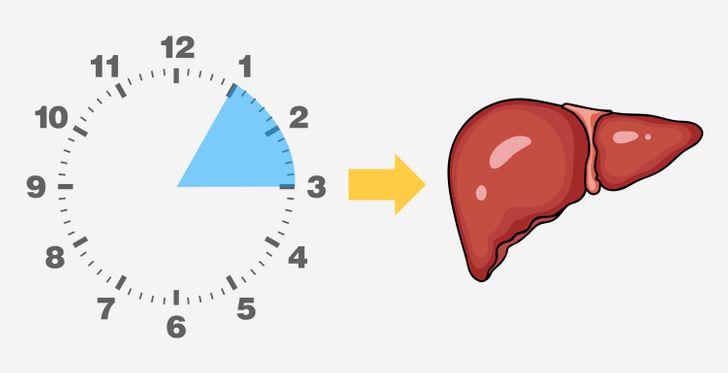
Between 01:00 and 03:00, the liver is at the forefront of the Chinese Meridian Clock. The liver is known for its detoxification processes and its role in regulating emotions. It filters toxins from the bloodstream and produces bile, both of which are crucial for maintaining overall health and a good night’s sleep.
The Liver’s Role in Sleep
- Detoxification: As the body detoxifies during sleep, the liver works hard to eliminate harmful substances. A sluggish liver may struggle to perform this function, leading to discomfort and disturbed sleep.
- Emotional Balance: TCM suggests that the liver is connected to the flow of emotions. Imbalances in liver function can manifest as irritability or mood swings, making it difficult to maintain deep, restorative sleep.
- Nutrient Metabolism: The liver also helps regulate the metabolism of fats and sugars. Disruptions in this process can affect energy levels, leading to nighttime awakenings.
Adopting a liver-friendly lifestyle can help improve sleep quality. This includes consuming antioxidant-rich foods, such as berries and leafy greens, and avoiding excessive alcohol and processed foods. For additional reading on liver health, explore Mayo Clinic’s liver health resources.
03:00-05:00 – Lungs: Breathing, Oxygenation, and Their Impact on Sleep
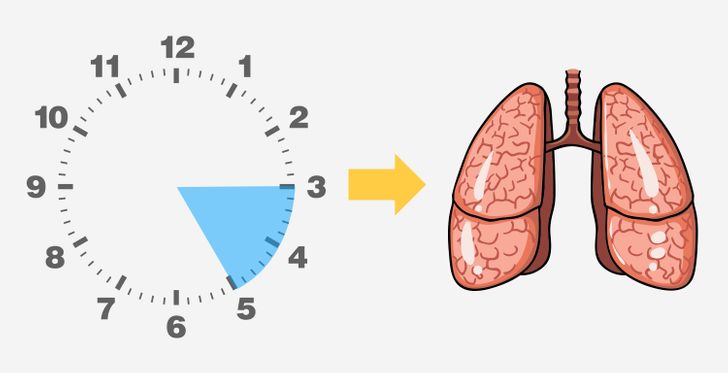
The time frame between 03:00 and 05:00 is governed by the lungs according to the Chinese Meridian Clock. The lungs are essential for breathing and oxygen exchange, and their optimal function is crucial for restful sleep. Disturbances in lung function can lead to sleep apnea, shallow breathing, or other respiratory issues that disrupt your sleep cycle.
How Lung Function Affects Your Nightly Sleep
- Breathing Quality: Proper lung function ensures that your body receives sufficient oxygen, which is vital for cell repair and overall vitality. Poor lung health can lead to shallow breathing, causing sleep disruptions.
- Respiratory Health: Conditions such as asthma or chronic obstructive pulmonary disease (COPD) can cause breathing difficulties, which may be more pronounced during the early morning hours.
- Environmental Factors: Allergens and pollutants can impair lung function, contributing to nighttime coughing or snoring. Maintaining clean indoor air and practicing good respiratory hygiene can mitigate these issues.
Improving lung health involves regular exercise, breathing exercises, and avoiding exposure to pollutants. For comprehensive guidance on lung health and sleep, visit Harvard Health Publishing’s respiratory health section.
05:00-07:00 – Large Intestine: Digestive Health, Detoxification, and Your Morning Wake-Up
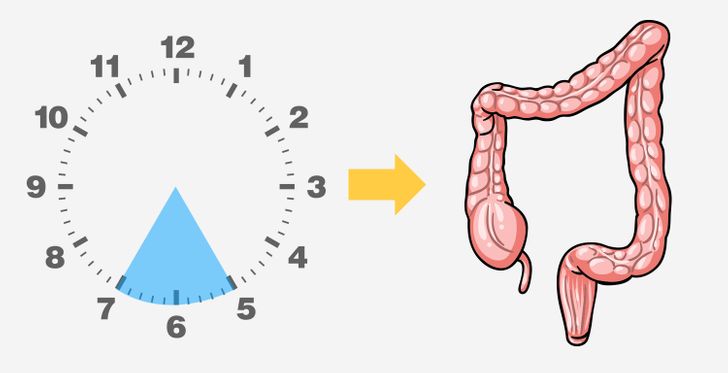
The Chinese Meridian Clock associates the early morning hours, from 05:00 to 07:00, with the large intestine. This phase is critical for the body’s elimination processes, where toxins and waste are expelled. The large intestine’s function can directly affect how you feel upon waking.
The Connection Between the Large Intestine and Sleep
- Detoxification and Elimination: A well-functioning large intestine is key to removing waste and preventing the buildup of toxins. When this process is disrupted, it can lead to discomfort and a restless sleep.
- Digestive Regularity: The health of your digestive system plays a major role in your overall well-being. Irregular bowel movements or constipation can cause discomfort that may wake you up early in the morning.
- Morning Routine: Many people notice that their digestive system is most active in the early hours. This natural cycle means that a fully functional large intestine can prompt an early wake-up, sometimes before the alarm clock.
To promote large intestine health, focus on a diet rich in fiber, stay hydrated, and consider probiotic supplements. Regular physical activity also aids in maintaining digestive regularity. For more information on digestive health, check out Cleveland Clinic’s digestive health resources.
Integrating Chinese Meridian Clock Insights into Your Sleep Routine
Understanding your body’s internal clock can empower you to take proactive steps toward improving your sleep quality. Here are some practical tips to incorporate the insights from the Chinese Meridian Clock into your daily routine:
- Establish a Consistent Sleep Schedule: Aim to go to bed and wake up at the same time every day to synchronize your internal clock.
- Create a Relaxing Bedtime Ritual: Engage in activities such as meditation, reading, or gentle yoga to calm your mind and prepare your body for sleep.
- Optimize Your Sleep Environment: Ensure your bedroom is dark, quiet, and cool. Consider investing in quality bedding and air purifiers to improve overall sleep hygiene.
- Monitor Your Diet and Hydration: Avoid heavy meals, caffeine, and alcohol close to bedtime. Instead, focus on nutrient-dense foods that support thyroid, liver, and digestive health.
- Incorporate Mind-Body Practices: Techniques like acupuncture, tai chi, or mindfulness meditation can help balance your body’s energy and promote restful sleep.
Conclusion: Embrace a Holistic Approach to Better Sleep
Waking up at the same time every night may be more than just a quirk of your internal clock—it could be a sign that specific organ systems need attention. By exploring the Chinese Meridian Clock, you gain a holistic perspective on how your thyroid, gallbladder, liver, lungs, and large intestine affect your sleep. Whether it’s through dietary changes, stress management, or improved sleep hygiene, incorporating these insights can lead to a more balanced and restorative sleep cycle.
This article has provided an in-depth look at how traditional Chinese wisdom combined with modern sleep science can help you understand and improve your sleep patterns. By addressing the unique functions of each organ during specific time windows, you can better diagnose potential issues and take action to enhance your overall well-being.
For more expert advice on sleep disorders and holistic health, visit trusted sources like Mayo Clinic and Healthline. Embracing both ancient wisdom and modern research may be the key to finally unlocking a night of uninterrupted, rejuvenating sleep.
By integrating these practices into your routine, you not only address the reasons behind waking up at the same time every night but also cultivate a healthier, more energetic lifestyle. Listen to your body’s signals, adjust your habits, and sleep smarter—because a well-rested you is the foundation of long-term health and vitality.









